Table of Contents
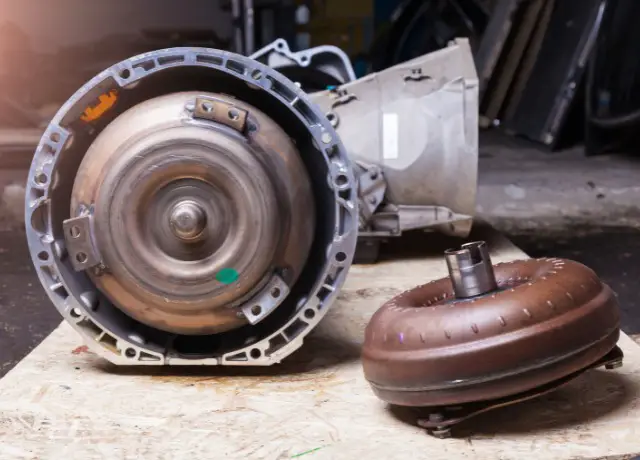
Understanding Torque Converter Noise at Idle
Understanding the various components of an automatic transmission system becomes essential as we navigate the complex world of automotive mechanics. In this article, we will discuss a specific concern: torque converter noise at idle.
The torque converter is an essential component of an automatic transmission and plays a crucial role in its smooth operation.
To help you resolve this issue effectively, we will explore the causes, symptoms, and potential solutions. So let’s get started:
Causes of Torque Converter Noise At Idle:
Several factors can contribute to idle torque converter noise. Let’s delve into the most common culprits:
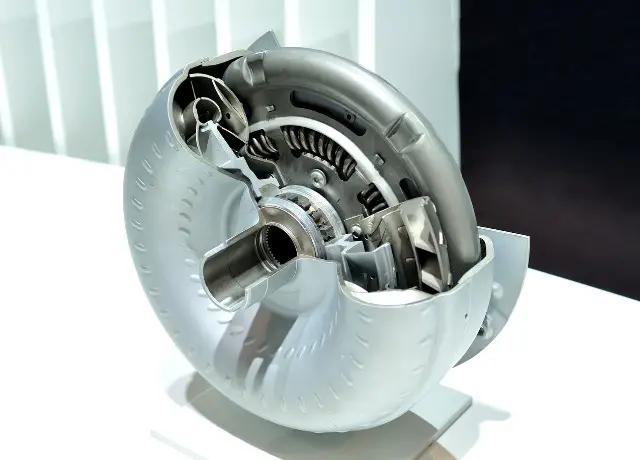
Worn-Out Bearings:
An integral part of the torque converter is the bearing. Due to constant wear and tear, these bearings may start to degrade over time.
They facilitate smooth rotation between the different parts and absorb the heat produced during operation.
As a result, the components no longer function effectively, causing friction between them. This friction can often be heard as a grinding or whining noise, particularly when the car is idle.
You can prevent this issue by performing regular maintenance and replacing worn-out bearings on time.
Loose Torque Converter:
An improper installation or wear and tear of the torque converter can cause it to become loose and cause rattling or vibrating. The torque converter should be securely fastened to the flywheel.
Typically, these noises are more noticeable at idle since the vibrations of the engine are not dampened by the vehicle’s movement. It is important to install the torque converter correctly and securely to prevent this.
Damaged Torque Converter Clutch:
When the torque converter clutch is damaged or faulty, it can fail to engage or disengage properly, resulting in abnormal noises.
It plays a crucial role in controlling the transfer of torque from the engine to the transmission.
Usually noticeable during idle, these noises may range in intensity from a slight clicking sound to loud banging or clattering noises. Replacing a faulty torque converter clutch would be the best solution.
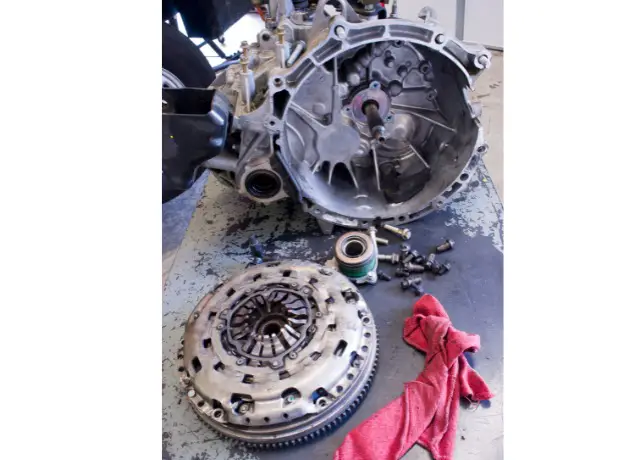
Broken Flex Plate:
As a connector between the torque converter and the crankshaft, the flex plate is extremely important. It must withstand a lot of heat and stress while operating.
If the flex plate becomes damaged or broken, the torque converter may wobble or vibrate, causing a noise at idle.
The flex plate must be regularly inspected and replaced to prevent noise and potential damage. A broken flex plate can also damage other components in severe cases.
Torque Converter Failure:
More severe cases can fail the entire torque converter. This usually occurs due to prolonged neglect of minor issues such as worn-out bearings or a damaged clutch.
The only solution in such cases is to replace the entire torque converter. Failure of the torque converter can lead to:
- Persistent Noise
- Transmission Slippage
- Overheating
Transmission Pump Failure:
Fluid flow in the torque converter is controlled by the transmission pump. If the pump fails, the fluid flow can be disrupted, resulting in inadequate lubrication and cooling of the components, causing friction and heat.
Moreover, a malfunctioning transmission pump may also cause poor shifting performance or transmission overheating.
For the torque converter to function properly, it is crucial to maintain the health of the transmission pump.
There are a few common causes that lead to a bad torque converter noise in your car. Let’s have a look at the common symptoms of idle torque converter knock.
Symptoms of a Failing Torque Converter
Identifying the symptoms of a torque converter rattle is crucial for prompt intervention. Look out for the following signs:
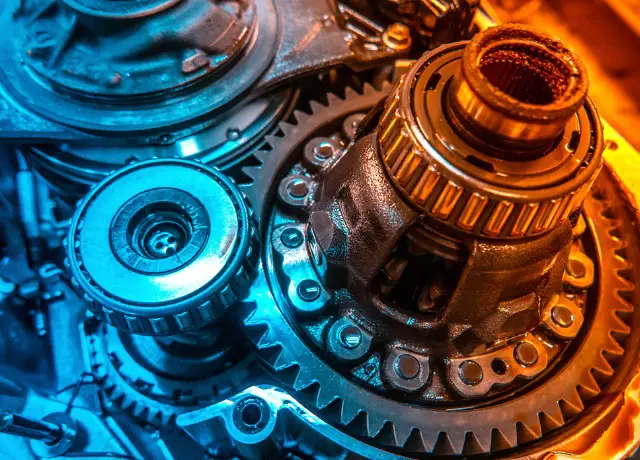
Gear Slippage:
Symptoms of a bad torque converter sound include gear slippage, which occurs when the converter cannot maintain the right gear ratio, resulting in a noticeable loss of power.
When driving in demanding conditions, such as climbing steep hills or towing heavy loads, this can be particularly problematic.
As well as affecting vehicle performance, gear slippage increases transmission wear and tear, potentially resulting in more serious problems down the road.
Acceleration Loss:
When the torque converter is functioning properly, it amplifies the engine’s torque, which improves the vehicle’s acceleration.
Loss of acceleration is another common symptom of an idle torque converter knock. It is possible, however, to experience a sluggish or delayed acceleration response when pressing the gas pedal, even if the converter is failing.
As a result, you may experience a heavy and unresponsive vehicle.
Rough Idling:
You may also experience a rough idle torque converter when your converter is faulty. When you idle your vehicle, you may experience unusual vibrations or shaking.
This is often the result of a problem with the torque converter’s stator, which directs fluid flow. Damaged or malfunctioning stators can disrupt fluid flow, resulting in rough idling and instability.
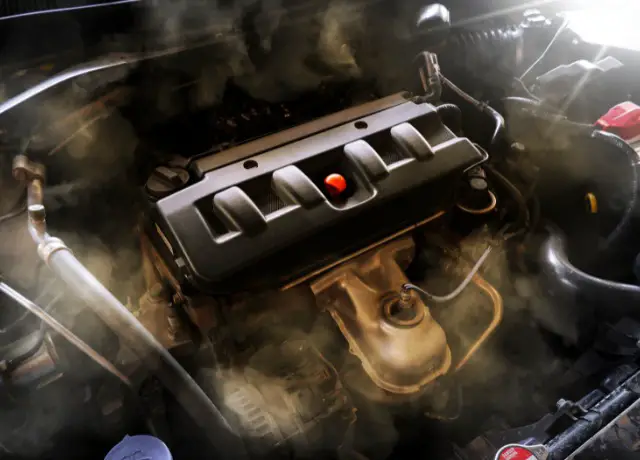
Overheating Transmission:
Transmission overheating can be caused by a failing torque converter. To maintain fluid circulation within the transmission system, the converter plays a crucial role.
If it begins to fail, this fluid circulation can be disrupted, resulting in inadequate cooling and, as a consequence, overheating. As a result, the transmission can be damaged over time.
No Gear Shift:
As a result of a failing torque converter, gear shifting can be completely blocked. As a result of the converter, power is transferred from the engine to the transmission, making gear shifts smooth.
If it fails, this power transfer can be disrupted, causing difficulty shifting gears or a complete inability to shift.
Shuddering and Jerking:
When the torque converter fails, the vehicle may shudder or jerk. Often, this happens due to problems with the torque converter clutch, which transfers power from the engine to the transmission.
When the clutch malfunctions or is damaged, it can create abnormal hydraulic pressure, causing shudders and jerks.
Noise from Transmission:
The transmission may also make unusual and persistent noises when it is failing. There are a variety of noises that can occur due to a bad torque converter, including:
- Rattling
- Grinding
- Whining
These noises are often noticeable at idle but can also be heard when accelerating.
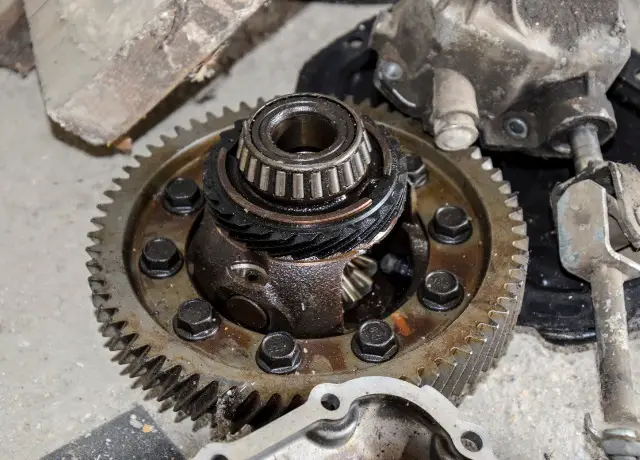
Contaminated Transmission Fluid:
Lastly, a bad torque converter can contaminate the transmission fluid. Overheating can also lead to the fluid becoming discolored and smell burnt.
It contains several moving parts that can wear out over time, releasing metal debris into the fluid.
It is crucial to check the condition of your transmission fluid regularly to detect potential torque converter problems early on.
How To Fix a Bad Torque Converter:
In some cases, addressing a bad torque converter requires careful consideration and professional assistance. Here are some potential fixes and preventive measures:
Shuddering or Gear Slipping:
Transmission fluids lubricate the torque converter components and facilitate smooth power transfer. When a torque converter fails, it can cause shuddering or gear slipping.
In some instances, flushing the transmission fluid and replacing it with new fluid can alleviate these issues.
Over time, the transmission fluid can degrade or become contaminated, leading to issues such as shuddering or gear slipping. Changing the torque converter’s fluid can resolve these issues and restore the torque converter’s proper functioning.
Contaminated Fluid:
Torque converter problems are often caused by contaminated transmission fluid. Regular fluid changes can help prevent fluid contamination.
Draining out old fluid, cleaning the transmission, and refilling with fresh fluid are part of this procedure.
As well as preventing contamination, regular fluid changes also ensure the torque converter retains its lubricating and cooling properties, ensuring its long-term health.
Overheated Transmission:
Torque converters and other transmission components can be damaged by overheating. The cooling system needs to be properly functioning to prevent torque converter overheating.
To prevent overheating, the radiator, coolant, and other cooling system components must be maintained in good condition. Overheating should be prevented by promptly addressing any cooling-related issues.
To provide additional cooling capacity, an auxiliary transmission cooler may be installed in severe cases.
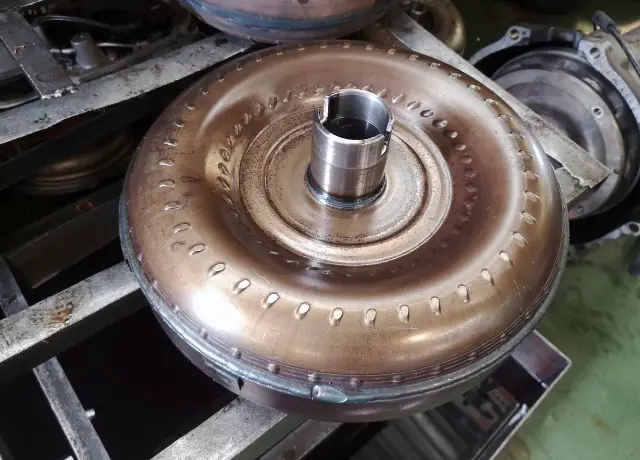
How To Quiet A Noisy Torque Converter? Prevention Measures:
To prevent torque converter problems, you should follow a regular transmission maintenance schedule. By regularly checking the transmission fluid levels and quality, topping up or replacing as needed, you can catch potential problems early on before they become more serious issues.
There may be early signs of a failing torque converter if you don’t listen to any unusual sounds or vibrations coming from the transmission. Ignoring these signs can lead to more serious problems, including complete torque converter failure. Whenever there are unusual sounds or vibrations, it is important to investigate and address them as soon as possible.
Lastly, scheduling periodic professional inspections is a good preventive measure. The torque converter and other transmission components can be thoroughly inspected by a professional for any signs of wear, damage, or malfunction. A professional can also perform necessary repairs or replacements to ensure your vehicle’s transmission system performs at its peak and lasts for as long as possible.
Bad Torque Converter Sound | FAQs:
Q: Is it possible to repair the torque converter?
Ans:There are some cases when a torque converter can be repaired. This depends largely on the extent and nature of the damage.
Minor problems like a clogged fluid passage or worn bearing may be fixable.
A torque converter may, however, need to be completely replaced if the damage is severe, such as a shattered turbine or a broken stator.
Q: How Does a Flex Plate Work?
Ans:It is the critical connection point between the torque converter and the engine’s crankshaft in your vehicle. Through the torque converter, power is transferred from the engine to the transmission.
As a result of its flexibility and ability to absorb vibrations and torsional forces, it’s called a ‘flex plate’.
Q: How Can a Bad Torque Converter Affect Your Driving?
Ans:There are several problems associated with driving with a bad torque converter, including poor vehicle performance, such as:
Slow Acceleration
Gear Slippage
Shuddering
It has been shown that faulty torque converters can damage other transmission components over time, resulting in expensive repairs.
Furthermore, severe torque converter problems can pose a safety hazard, such as sudden loss of power.
Q: Is there a reason why a transmission makes a whining noise?
Ans:One common cause of a whining transmission is a worn-out bearing or a failing stator in the torque converter.
In addition, worn-out gears or bearings within the transmission itself can also cause a whining noise, since there’s not enough fluid to lubricate and cool the transmission components.
Low fluid levels can cause a whining noise as well.
Q: Why Do Torque Converters Shudder?
Ans:The torque converter often shudders when the transmission fluid is worn out or contaminated.
Worn-out or contaminated fluid can interfere with the smooth flow of power from the engine to the transmission.
Other potential causes include a malfunctioning torque converter clutch or damaged internal components.
Q: When the torque converter is idle, does it spin?
Ans:As long as the engine is running, the torque converter will continue to spin. It is directly connected to the engine’s crankshaft, so it can spin at idle as well.
While idling at a stoplight, the vehicle can remain stationary while the engine is running and the transmission is in gear because of this continuous operation.
Q: When I accelerate, my transmission is noisy. Why is that?
Ans: There are several reasons why a transmission can become noisy during acceleration, including a failing stator or worn-out bearings in the torque converter.
Also, worn-out gears or other transmission components can lead to noise when accelerating.
As a result of inadequate lubrication and cooling, low transmission fluid levels or poor-quality fluid can also cause noise during acceleration.
Conclusion
It is crucial to maintain a healthy transmission system by being aware of the signs of torque converter noise at idle and understanding what it signifies.
When torque converters fail, it is important to recognize the warning signs so that potential issues can be addressed promptly and effectively.
It is always recommended to seek professional assistance when dealing with intricate mechanical components like the torque converter.
Maintaining your vehicle regularly, paying attention to any unusual signs, and following preventative measures will not only make your vehicle perform better, but it will also make it easier to drive.
By being proactive and informed about the health of your torque converter, you can have peace of mind. Drive safely!

























































